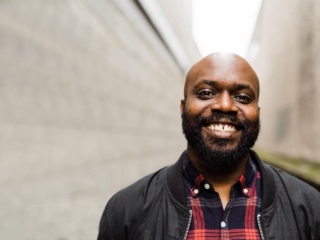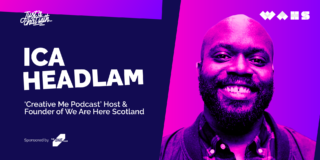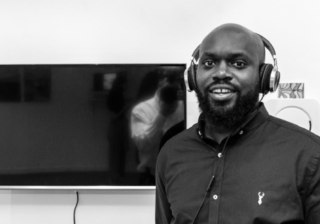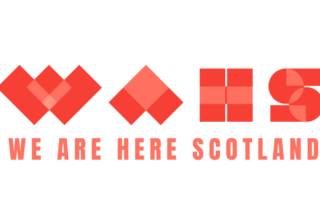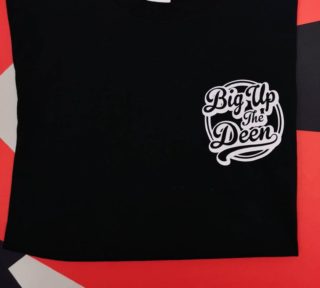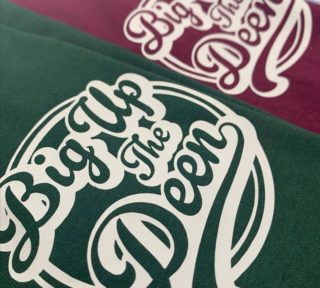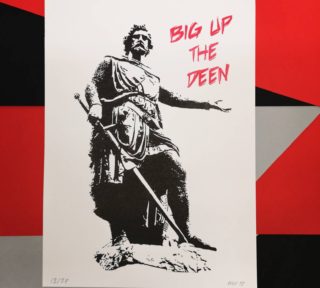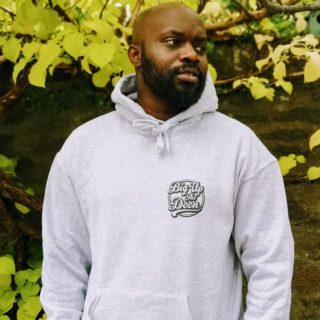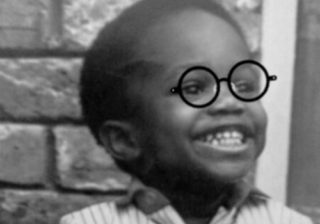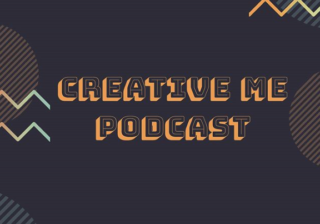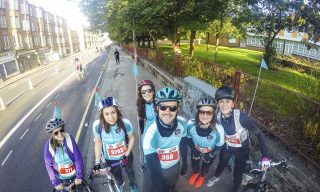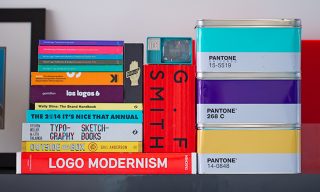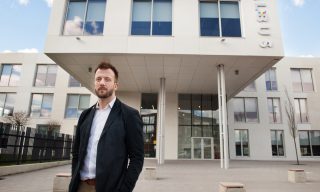You might remember last year we rolled up our collective sleeves to learn about and highlight some of the incredible past and present designers, artists, filmmakers and copywriters for Black History Month. There’s more on that here.
This year, we want to shine a spotlight on the amazing Ica Headlam, founder of We Are Here Scotland, who are working to directly support the next generation of BIPOC creatives—the future history makers here in the UK. You can learn more about the Creators’ Fund here or donate here.
A bit about Ica
In late 2017 Ica started to independently produce and host the Creative Me Podcast, a weekly show that explores creativity and arts in the North East of Scotland, with the aim of drawing a wider focus on Aberdeen’s creative community. To date, it has been commissioned for the Look Again Festival, Northlands Creative, and City Moves festival dance live. The podcast has also been downloaded over 26,000 times, and is about to hit 100 episodes. You can have a wee listen and subscribe here.
Ica is also the founder of ‘We Are Here Scotland’ a platform that aims to amplify the voices of Black and People of Colour artists and creatives across Scotland’s creative industries. Ica is also a qualified social worker who works with vulnerable young adults across Aberdeen. He’s a strong advocate for representation across the arts and values the importance of open and honest dialogue.
Hailing from South East London, Ica moved to Scotland in 2004 and now lives in Aberdeen with his wife and two and a half-year-old daughter.
And our Andrew Dobbie got a chance to interview Ica for this month’s Just a Chat With podcast!
Andrew: Hey, Ica! How are things going with you? How has 2021 been treating you so far?
Ica: It’s been a bit full-on. We moved house in the middle of the pandemic and then it’s been really busy with work and everything happening behind the scenes. On the podcast front we’ve been doing support and consultation with people, and giving some guidance—for myself everything was self-taught when I was starting out, so just wanting to help wherever we can.
Then earlier this month, we started taking applications for the We Are Here Scotland Creators’ Fund, as well—I’m sure we’ll touch on that as well later on in the chat. But, yeah, it’s been all good, man!
Andrew: And you had a difficult time with COVID, is that right? How did that affect you?
Ica: Yeah, actually, one of my friends from work jokes about this and says I got the raw, unfiltered COVID last year. My wife is an advanced nurse practitioner—she caught COVID then I caught it.
The first week, you feel like you’ll ride it out. I thought, “Oh, it’s a bit like the flu” and it did feel like the flu. But the second week I had to go to A&E. Then I was on an online consultation with NHS 24 and the Doctor was like, “Right, I need to get you straight to the hospital”. It was a difficult and challenging time.
At one point when I was waiting for the ambulance, my daughter, who was just one and a bit then, was waving like ‘Bye’ and I thought that could have been it, I might not have come back home from that. You think, “Right, I gotta take care of myself.” You’ve got to think a bit more about how you go about doing things, like, “I’m kinda overworking myself here. Let me just chill out.” It’s really put things into perspective.
So, the base of We Are Here Scotland is how can we create something positive out of all these frustrations and tragedies. How can we actually lift each other up, specifically within the creative industries, because, as you know, the creative industry is a difficult thing to navigate.
Andrew: Could you tell us about We Are Here Scotland and the Creators’ Fund?
Ica: For me, I come from a place where it’s very multicultural, from London. I’m used to seeing a lot more representation of people that look like me. But, in the Northeast of Scotland, especially on the creative front, I went to a lot of events or social gatherings and I didn’t see anything that represented me on the wall space or in terms of people who organise these events. I mean, all good relationships there, but, I felt like I wanted to connect with people that look like me, but it all felt a bit disjointed. So With We Are Here Scotland I wanted to create more of a unification, more of joined-up thinking in terms of what we can do to support each other while we’re in this really interesting, diverse, and creative community.
Then on the back end of last year, with the whole George Floyd thing and also Breonna Taylor and lots of other issues—my frustrations were even more evident. You’d obviously look back, kind of acknowledging what’s happening in the U.S. but also being like, “Hey, guys, this has been happening in the UK for a very long time, as well.” The hurt and the anger is pre-existing and it’s multi-generational and there is that, within a lot of different structures, not just within the creative industry—there has to be some change.
So, the base of We Are Here Scotland is how can we create something positive out of all these frustrations and tragedies. How can we actually lift each other up, specifically within the creative industries, because, as you know, the creative industry is a difficult thing to navigate. It can be quite insular. It can be a bit insidious sometimes, as well. And it’s about who you know and that allows some people to get opportunities that others don’t. So We Are Here Scotland is actually about how we can make things a bit more of a level playing field for people in the Black and POC community.
So for the Creators’ Fund, a big element was to create something that was accessible to artists and creatives in the community. But, also a bit of follow-through, hence why we’re looking for mentors as well to mentor the potential awardees.
Our application form is all on the website and people have got until 31st October to complete that. We’re looking to award six or seven people this year, then another six next year as well. The fund is for 500 pounds each and, yeah, we’re definitely encouraging Black and People of Color within the creative industries to apply: musicians, visual artists, photographers, videographers, graphic designers – everyone.
Andrew: Can you tell us a bit about your clothing brand, Big Up the Deen?
Ica: So actually when I started my podcast I was thinking like, “Oh, how am I going to fund my efforts if I want new equipment?” I’ve always been interested in clothing so I launched Big Up The Deen in early 2018 with a few Etsy pop-up events and it’s just grown. As for the idea behind the whole thing, “Deen” is short for Aberdeen, and “Big Up” is, for my cultural background, my family being from Jamaica, we would always say like, “Yeah, big up yourself” and stuff like that. So, it’s actually saying, “Yeah, take pride in what’s happening within our city.”
It’s been a really exciting thing, having a small business and helping and supporting our local businesses, but also actually drawing that interest back into what’s happening within the Northeast of Scotland as well. And yeah, it’s been a collaboration with artists that have been on the podcast, as well, so, it’s been really cool. I can’t do it as regularly as I would like with a full-time job like social work, being a parent, being a husband, and all of that responsibility.
Andrew: You mentioned social work—is there a crossover between this and what you do creatively?
Ica: There’s definitely is and I think it blends very well. On the creative side, working with vulnerable members of the public, especially young adults, I’ve always used what I learned about art and design in London to help with young people who struggle to communicate. So, doing life story work and working in a way that benefits a young person and not just using structural systems of council social work. I always find that challenging for young people. If you sit across from them with a bit of paper and are like, “Tell me you’re life story?” there are creative ways you can get them to express themselves and so I’ve always kind of taken that tact.
There’s the community aspect, as well. That’s one of the biggest drivers for me, allowing young people to recognise there are other possibilities for a career. Because for a lot of the young people we work with, it’s kind of like they’re in a bubble, so, it’s about exposing young people to interesting things and giving them a viable option in terms of actual work, a career, or if they want to go study something. So, that’s always been my kind of mindset, not always just on the creative side of things, but exposing young people to new and challenging interests.
It’s not an attack on the predominantly White-led organizations. It’s like, “No, just listen. I’m not coming for your jobs or anything.” It’s not as if I’m actually saying, “We want a seat at the table.” We’re creating our own tables already. But, we just want to be seen and respected.
Andrew: You were talking about London. Is that where you got your start?
Ica: Well I went to City of Westminster College in Paddington Green and studied art and design, but, at the age and stage when I went there, I was a bit unruly. And, so, I did a year of that, dropped out, and then just was sort of like, “I’m just gonna go and work and just have fun.”
I remember I was working in Sainsbury’s and my friend, who was volunteering said, “Oh, just come and join me.” My friend worked with vulnerable adults with substance abuse and mental health issues. And I thought, “All right, I’ll give that a try.” I ended up being there for a year, then I moved to Aberdeen and I felt like, “Right, don’t want to really work in retail. I don’t really feel like there’s given me any kind of drive or purpose or making me happy. I’ll give social work a go. I actually like helping people, working with people” So, yeah, I just did a couple of years at college, at H&C level, then went to Robert Gordon University in Aberdeen. I just did my BA honours in social work and graduated in 2011. So yeah, all of it was a natural transition, and it happened at a right time for me, as well.
Then, growing up, my older brother, Gavin, would go and cut people’s hair in our garage and stuff like that and he was really, really good at art. Then my mum was a really good singer within that Caribbean culture. So, my family had jobs, but they also had their side hustle as well, never just actually being content with what they had. I grew up in a single-parent household and my mum couldn’t afford to give us everything that we wanted. So, that was the kind of thing I really do look back on and appreciate my mum exposing us to that. I think I’m very thankful that I wasn’t just always contained in the bubble of Southeast London. It was just like, “Oh, let’s just go to Brighton for the day” or “Let’s just go to Margate” and stuff like that. Just lots of different experiences I think definitely helped me.
Andrew: So you host the Creative Me Podcast which is all about art and creativity. One hundred episodes is quite an effort!
Ica: Well, it links to my job a bit. I remember one of my former colleagues sent me an email from a Council-funded organisation that were doing workshops. I met really interesting artists and creators and I felt then like, “Hey, I love podcasts, but no one’s documenting all this really interesting talent that I’m seeing in the Northeast of Scotland.” So I pitched to the Aberdeen City Council’s Creative Fund and got about half the money I needed.
As well, with the podcast, it was actually a lot of self-talk as well. If I go back and listen to any of my first episodes, I actually cringe because, especially the sound level has just been like, “God, this is really bad.” Yeah, so, you learn. Also, I’ve someone called Jake Lawson involved in doing the editing for me. He’s taken the podcast up another level. But it’s not easy, it’s a hard graft!
Andrew: I totally agree that there’s a huge problem with representation and maybe naively, in the past, it’s not something I fully considered. I think what’s been eye-opening for me is in having these conversations I’ve realised as a white person running a creative business that we have a part to play to look at what unconscious bias we have, to listen and understand how we recruit, how we talk, what we use our platforms for, and changing some of the behaviour so that it’s fair for everyone. I’ve found that as a white male, entering the creative industry is hard enough, so I can only imagine when you don’t have a voice in the creative industry and you’re not seeing other people like you, how hard that’s going to be. So for anyone listening what are some of the things that people can do to help, to support the cause?
Ica: For me, one of the important things, especially in conversations I have with people privately, across Scotland is actually for the more established, White institutions or organizations, is to actually listen when people are voicing their frustrations. It’s not a personal attack on an individual per se, but, for example, if somebody was venting their frustrations at me about something I run or organise, I’d want to actually listen to them and be like, “Right, let’s have an adult conversation.”
I think a lot of organisations are like, “Yeah, we’re here to listen” but then when people start speaking their truth or their lived experience, they clam up and are like, “Oh, that’s making me feel really awkward – I don’t want to speak about this.” That’s one area I will say, I appreciate that open and honest dialogue. Before you get comfortable, you have to get uncomfortable. We have to have these kinds of conversations – like why is there a lack of representation? Why aren’t we seeing more People of Colour in positions of power and actually making decisions? Why do we always have that?
Things are changing, but, it’s always been this drip-feed kind of process. So, how can we move that along in the right way, not just as a tick box exercise so I can say, “Oh, yeah, I’ve done my part. I’m absolved from any kind of responsibility now.” So, that’s my thing. There needs to be more of an open, honest conversation, and when people were speaking, especially People of Color within the creative industries, they deserve to be listened to. It’s not an attack on the predominantly White-led organizations. It’s like, “No, just listen. I’m not coming for your jobs or anything.” It’s not as if I’m actually saying, “We want a seat at the table.” We’re creating our own tables already. But, we just want to be seen and respected.
Andrew: Do you have any advice for any younger creatives who are listening, particularly those who are BIPOC?
Ica: I think I would say to any younger people to just find and connect with like-minded people. Connect with people that you want to create and do things with and just start doing stuff—just start creating. You have to get our your comfort zone, as well. If you’re hungry and you’re passionate about what you’re doing, a big element of that actually is stepping out of your comfort zone and contacting people. Also recognising that there are people who’ve been in your shoes at the same point, knowing, they’ve found ways to navigate that as well.
Andrew: Definitely. Thanks, Ica! I feel like we should give a shout out to the creatives from Aberdeen today. For me, being down in Glasgow, there’s a huge beacon of creativity shining from Aberdeen and I see it and you’re obviously playing a big part in that and helping elevate so many creatives up there. I’ve been inspired reading your creative journey and everything that you’re doing. Thanks again!
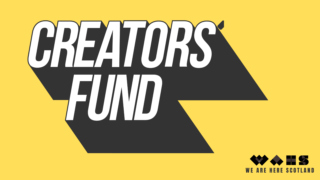
More about We Are Here Scotland and the Creators’ Fund
We Are Here Scotland launched the Creators’ Fund to provide BIPOC artists and creatives with funding opportunities to help them progress in their professional development. On 9 June, the Creators’ Fund reached its £6000 target (now £7,500!), and they’re accepting applications. The fund will not only provide financial support but also practical career advice, support, and guidance.
Interested in applying for the Creators’ Fund or are you interested in becoming a mentor? Apply here before October 31st!
MadeBrave has donated to support the Creators’ Fund and you can too, by donating on their gofundme page!
